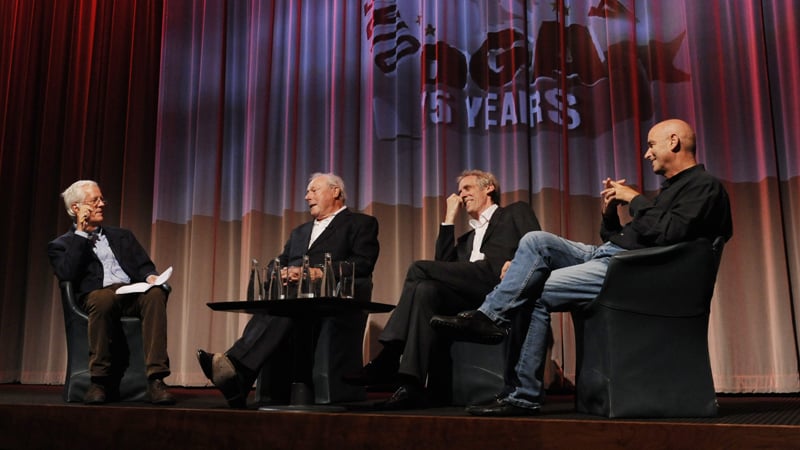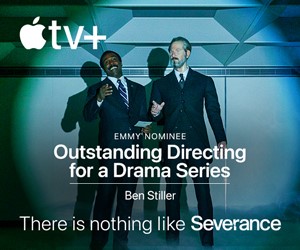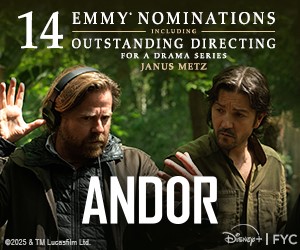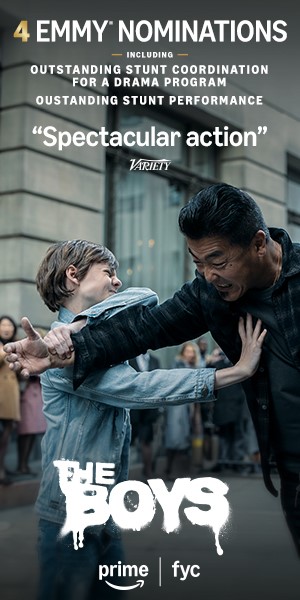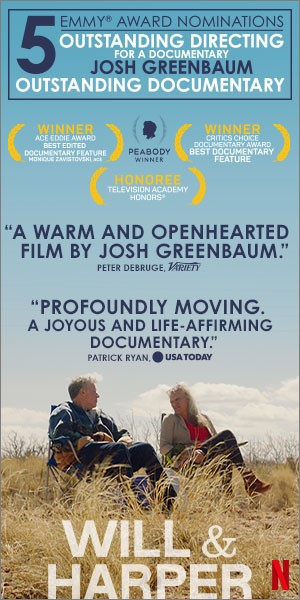Still photos by Rune Hellestad
DGA members in the UK paid tribute to the directors of the world's longest running film series during the 75th Anniversary Game-Changer event Directing 007. Organized by the DGA’s London Coordinating Committee (LCC), the event took place on September 20 at BAFTA’s Princess Anne Theatre in London and featured a live panel of Bond directors ‑ Martin Campbell (Casino Royale; GoldenEye), John Glen (License to Kill; The Living Daylights; A View to a Kill; Octopussy; For Your Eyes Only), and Roger Spottiswoode (Tomorrow Never Dies) ‑ in a conversation moderated by Michael Apted (The World is Not Enough).
“Nearly 700 DGA members now live outside the US, with about 300 of them here in the UK and Ireland and approximately another 160 in continental Europe,” said LCC member Richard Loncraine in his welcome to the audience. “As the non-US-based membership continues to grow, the DGA is committed to fighting for the creative and economic rights of all DGA members, wherever they may live or work.” After speaking more about the work of the Guild on behalf of members in the UK & Ireland and thanking the Guild's staff and leadership, Loncraine introduced 75th Anniversary Advisory Committee Chair Michael Apted.
“It's a pleasure to be here tonight to moderate what promises to be a fascinating look at one of the most popular film franchises of all time and one that is close to my heart," said Apted. "When the first Bond film opened in 1962, it pretty much invented the movie spy thriller. Bond remains the most enduring and successful movie franchise of all time. At the DGA we’d like to think that some of this, is because of the many talented directors who have guided 007 throughout his nearly 50 years and an amazing 22 films, and this is our tribute to them and to the franchise."
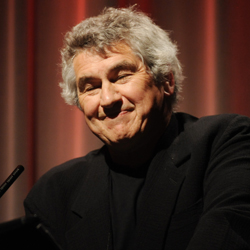
LCC Member Richard Loncraine
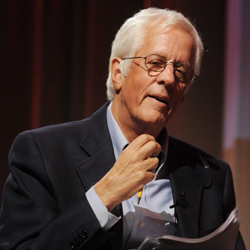
Moderator Michael Apted
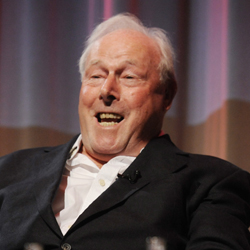
John Glen
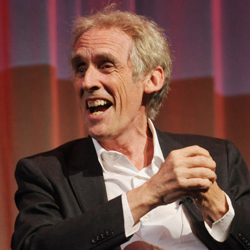
Roger Spottiswoode
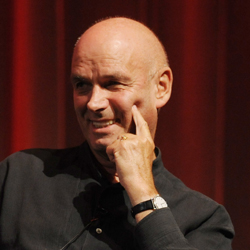
Martin Campbell
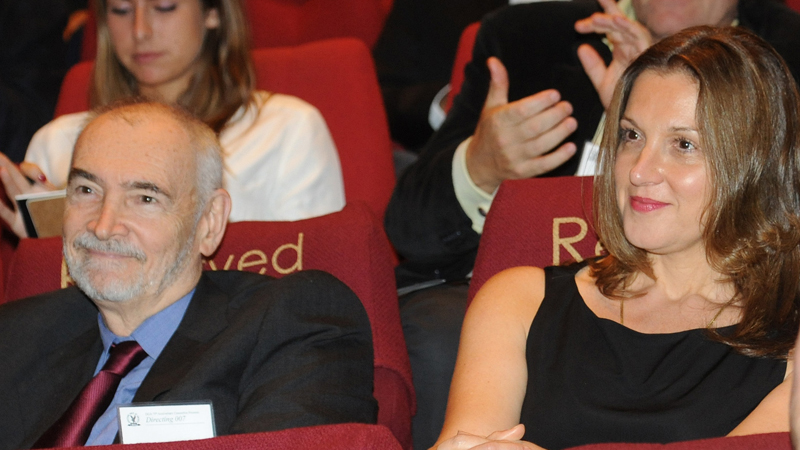
Bond producers Michael Wilson & Barbara Broccoli
Following a video montage of clips from all 22 films, Apted paid tribute to the late directors Terence Young who set the stage with the very first film, Dr. No, and went on to direct From Russia with Love and Thunderball; and Peter Hunt, who directed On Her Majesty's Secret Service. Then he presented videotaped comments from directors Guy Hamilton (Goldfinger; Diamonds Are Forever; Live and Let Die; The Man with the Golden Gun) and Lewis Gilbert (You Only Live Twice; The Spy Who Loved Me; Moonraker) who spoke about their memories of the franchise.
The panel then took the stage and after a screening of clips from his films Octopussy and Licence to Kill, John Glen revealed that the Bede Jets used in Octopussy were originally created for Moonraker. "Our production designer, Peter Lamont, had stored them in case some time in the future we might need them. Sure enough, when I saw them, [writer/producer] Michael Wilson and I decided to construct this opening sequence. It had nothing to do with the film that followed and it was 26 minutes!"
Glen has been in the film industry since 1947 when he joined the editing department of Sir Alexander Korda’s London Films and worked on such classics as The Third Man and The Italian Job. A DGA member since 1990, Glen’s first experience with 007 came as the editor and second unit director on 1969’s On Her Majesty’s Secret Service, 1977’s The Spy Who Loved Me, and 1979’s Moonraker before he was asked by legendary producer Albert “Cubby” Broccoli to direct 1981’s For Your Eyes Only. Glen would go on to direct four more Bond movies: Octopussy (1983), A View to a Kill (1985), The Living Daylights (1987) and Licence to Kill (1989), giving him the record for having directed the most Bond films to date.
Recalling the difficulty they had in coming up with new action sequences for the series, the panel agreed that perhaps the best stunt ever was Bond's ski jump escape in The Spy Who Loved Me where the parachute opens revealing a Union Jack. Glen recalled that he spent three weeks above the Arctic Circle as the second unit director to achieve that shot. "Fortunately we were out of touch with telephones," Glen laughed. "I could feel the pressure coming from London though."
Next up was a clip from Martin Campbell's first adventure with Bond, 1995’s GoldenEye. Campbell spoke about the game-changing aspect of casting Judi Dench as Bond's superior "M" ‑ a role traditionally played by a man. “There was a big gap between John's last film and GoldenEye and there was a perception in the press that Bond was past its 'sell by' date even with the restart with Pierce Brosnan as the new Bond. So one of the ideas discussed was a female 'M' as a game-changing thing to bring it into the '90s. But there was also the idea of the line about him being a 'sexist, misogynist dinosaur' was addressing the audience's question before they had the chance to ask it. So we all decided it was important to put Bond in perspective of 1995.”
Roger Spottiswoode spoke about following up Campbell's GoldenEye with the 18th Bond film, Tomorrow Never Dies. "I remember Barbara Broccoli and Michael Wilson asking me, 'What would you like to bring to the series?' It had taken this big step forward and I thought we could have a Bond woman who would be somebody who is very much an equal. I had two nephews here in London and I mentioned we might be changing the Bond girl, and they both said Michelle Yeoh! They went to a video store and brought me a number of Jackie Chan films she was in and she was wonderful! Two days later I was flying to Hong Kong to meet with her."
A DGA member since 1981, Spottiswoode started his film career as an editor on Sam Peckinpah’s legendary Straw Dogs. After directing a number of feature films such as Under Fire, Shake Hands with the Devil, and the DGA and Emmy-nominated 1994 movie for television And the Band Played On, Spottiswoode's Tomorrow Never Dies went on to gross over $300 million worldwide. He showed a clip from the film where Bond is being chased in a parking garage and controlling his car remotely via his phone.
“We spent a lot of time working out how to get some humor into it, how to keep it going and how to make it look like there were a lot of levels in the chase when really we were on the same level all the time. We had six weeks of learning how to drive the car with somebody underneath the driver's seat using seven television screens." He also revealed that the scene was born out of the need for product placement of the phone, but when he went to Germany to view the car BMW was hoping to use for the film, he was horrified when they wanted him to use a two-seater Z model. "I didn't think it was very Bondian. I panicked. I didn't know how to turn it down, but I said, 'Look, it's really great but it doesn't have a back seat.'" Another executive then offered him a BMW motorcycle that he was able to use in another sequence. "I'd always wanted to do a David and Goliath scene where a motorcycle is being chased by a helicopter and is brought down with a sling. So the motorcycle guy talked to the other guys and we ended up with both the motorcycle and the BMW 740 with a back seat.”
Apted revealed that he was brought on when the franchise was trying to attract more women to the audience. "I was hired because I'd worked with women a lot," he recalled. A DGA member since 1978, Apted served three terms as President of the Guild and helmed an extensive list of feature films and documentaries. He showed a clip from his Bond film, 1999's The World Is Not Enough, which featured a female villain played by Sophie Marceau. “You'll see that 'M' is in it because we had the idea to get her out of the office and outside and part of the plot. But the main point is that we took the risk in turning the whole Bond thing upside down. This woman did to him what he'd been doing to women in the previous 18 films. She seduced him, strung him along and was way ahead of him on all points. We agonized on how to get rid of her, could Bond actually kill her? We finally came to the conclusion, if we were going to have the balls to make a woman a full-fledged Bond villain, if she lived by the sword, she would have to die by the sword.”
Campbell returned to the series in 2006 with the critically acclaimed Casino Royale which is the highest-grossing Bond film to date. Casino Royale had previously been made as a non-franchise Bond film by Columbia studios. “It was a comedy with five Bonds. I think Woody Allen was one of them and Ursula Andress was another! The rights became available about a year before year before we started to film. The idea was simply to go back to the tone of the books. In a way it's a prequel to Bond. In the books, there's very little humor to Bond. He's a much more bruised character who drinks too much, smokes heavily and there's a violence that's kind of ugly and messy that he's uncomfortable with and this is the one love affair of his life. This was the defining relationship and at the end he becomes the Bond we know, the guy who's shut down emotionally with this attitude towards women. I think when Terence Young made Dr. No, he brought the humor in. None of that is in the books. They're much darker and he's a much more flawed character.”
In closing the event, Apted also noted the attendance of Bond producers Barbara Broccoli and Michael Wilson and thanked them for their assistance in putting the event together and curating the collection of Bond memorabilia that was on display in the lobby during the reception.
